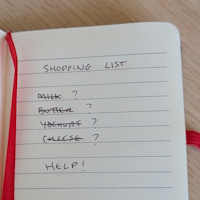At the supermarket
The first thing you will need to figure out is an alternative to milk, especially if you are a fan of breakfast cereal. Soya milk is a good option to start with, but more and more dairy-free milks are appearing on the supermarket shelves. See Milk Alternatives for some other types of plant-based milk. My absolute favourite for tea and coffee is Oatly Barista. It has a bit more fat than the standard oat milk which makes it 'foamable'. This also happens to make it mix really well with tea and instant coffee. Of course you can also try other teas that don't need milk such as peppermint, chamomile, and green tea.
To replace butter on your toast and in sandwiches there are a few dairy-free options. My favourites are Pure margarine, and Flora plant-based spread. Incidentally, Flora recently announced that all of their products are going to be plant-based. Their foil wrapped plant butter is also very good, especially for baking.
Thanks to the popularity of veganism, in recent years there has been a huge improvement in dairy-free cheese. Back in the day (2000's) you could only get them in health food shops, they were mostly made from soya, and to be honest they were awful. Now the current generation of vegan cheese is not particularly nutritional - they are normally made of coconut oil and starch. But I think they do have a place, especially when you are craving a cheese toastie! They are found in supermarkets in block form, sliced, or grated. Cathedral City even have a plant-based cheddar now which has had mixed reviews, but I like it. There are some great vegan mozzarella-type cheeses that melt really well, and slices of what I call 'plastic burger cheese' that are just as good in a burger as the dairy ones. A more nutritional type of plant-based cheese is made from nuts, such as Mouse's Favourite. These are a bit more specialist (and expensive!) and you won't find them in the supermarket but they are worth seeking out. I am lucky to have a local vegan deli which sells them.
I spend a lot of time looking at labels in the supermarket. It's a bit daunting at first but you will soon get to know which foods are safe. The good news is that since milk and eggs are common allergens you will see them in bold in the ingredients list. You can also look out for foods labelled as Vegan or Plant-Based, although it is still worth checking the labels depending on how sensitive you are to dairy. Sometimes you will see May contain traces of milk or This product is not suitable for people with milk allergies to due manufacturing methods.
If you cook from scratch, you're already on to a winner — especially if you have allergies or intolerances. By preparing your own meals, you have complete control over every ingredient that goes in, which means no surprise allergens.
Unlike processed or pre-packaged foods which can contain milk powders, whey, or other sneaky sources of dairy, home-made dishes let you tailor your meals to your needs without compromise. It's not just safer, it's often healthier and more satisfying too!
See the Recipes section for some ideas.Milk and eggs can often be found in places you wouldn't expect....
Crisp flavourings often seem to contain lactose — and not just the obviously cheesy ones. You might expect cheese and onion or sour cream varieties to have dairy, but even flavours like salt and vinegar can unexpectedly include lactose, milk powder, or whey as part of the seasoning mix. These ingredients are often added to enhance mouthfeel or balance acidity, even when the flavour itself doesn’t seem dairy-related.
If you're avoiding dairy, the safest option is usually plain salted crisps, which tend to be free from milk ingredients. Still, it's essential to keep checking labels every time, as recipes can change without warning.
Research shows that dark chocolate is good for you! It's rich in beneficial nutrients and antioxidants. You'd think it would be always dairy-free but sometimes dark chocolate contains dairy products, so check the label for ingredients such as 'milk fat' (I'm looking at you Lindt).
There are also now lots of vegan 'milk' chocolate bars becoming available, albeit with a hefty price tag. They are made with rice milk, oat milk and various nuts.
It's unusual but some types of bread contain milk. Brioche has milk and eggs in it (for some reason this seems to be the go-to burger bun).
Gluten-free bread almost always contains egg whites, but there are some brands such as Schar which do not.
Eggs and milk protein are sometimes used in the production of wine and beer! It sounds weird but egg whites are used to remove unwanted particles from wine (mostly in red wines) to make it clearer, smoother, and more refined.
Since 2012, wines sold in the EU and UK must state if they contain residues of these allergens above 0.25 mg/L, but this is not the case in the USA where labelling laws are less strict.
Pills sometimes contain lactose, so make sure to read the label. Look for capsules, for example paracetamol capsules with the plastic-type coating may not contain lactose whereas the traditional 'chalky' pills do.
For some medicines, such as antihistamines there are liquid alternatives. The quantities of lactose in medicine is normally very small, so it depends how sensitive you are to lactose. Ask your pharmacist for advice.
